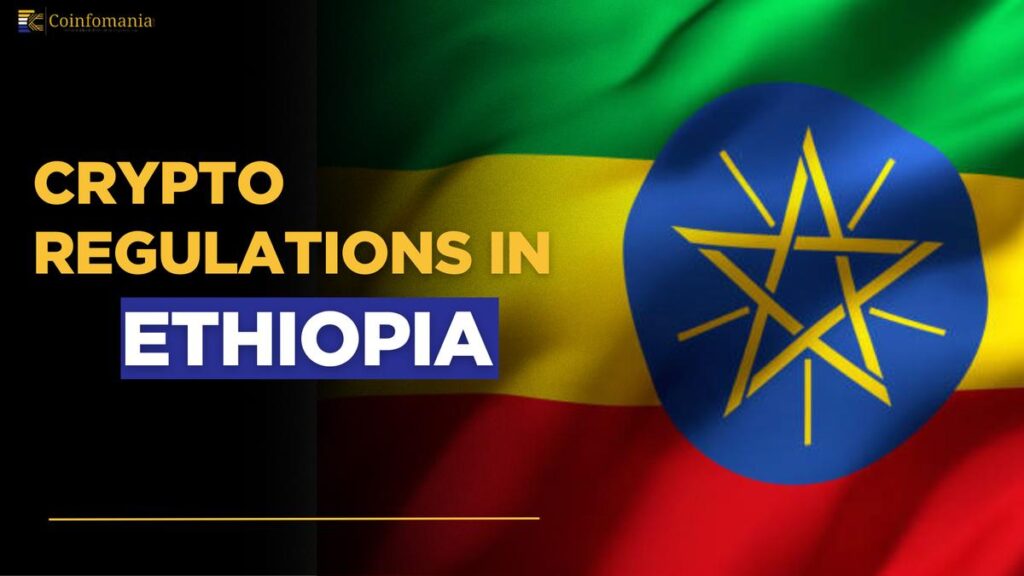Cryptocurrency Laws in Ethiopia
Ethiopia’s approach towards cryptocurrency has always been cautious. It is slowly developing policies in the year 2025. The country does not endorse cryptocurrencies as a whole for transactions but is establishing a framework for digital assets. The crypto affairs remain under the National Bank of Ethiopia (NBE) as the regulator in matters of protecting financial stability and preventing illegal transactions. It would be beneficial for organizations, investors, and users to have a complete understanding of Ethiopia’s crypto regulations to avoid legal obstacles. As the nation moves towards regulating crypto mining, it maintains restrictions on payments using digital currencies. Compliance for licensed operators under AML and KYC principles is required.
Some essential regulatory organizations involved:
- National Bank of Ethiopia (NBE): Supervises the financial policies, including the crypto policies.
- Ethiopian Capital Markets Authority (ECMA): Oversees the crypto assets related to securities.
- The Innovation and Information Technology Ministry is interested in the issuance of nationwide regularization of blockchain endeavors.
Historical Context
Ethiopia initially had no regulated crypto laws, leading to unmonitored usage. In 2022, the NBE issued advisories against dealing in cryptocurrencies citing financial risks, but by 2024, the government accepted blockchain technology, resulting in the formulation of regulated terms. Some milestones include:
- 2022: NBE banned crypto for payments but allowed blockchain exploration.
- 2024: Ethiopia introduced licensing for crypto mining companies.
- 2025: New NBE standards clarified AML/KYC requirements for crypto businesses.
Regulatory Framework
Key Regulatory Authorities
- National Bank of Ethiopia (NBE): Controls but prohibits crypto payments mining.
- Ethiopian Capital Markets Authority (ECMA): Manages security tokens if classified as financial instruments.
Licensing & Registration
- Crypto mining requires government approval.
- Exchanges must register with the NBE and comply with AML laws.
AML & KYC Requirements
- Mandatory for licensed crypto businesses.
- Transactions must be traceable to prevent fraud.
Taxation
- Crypto mining profits are taxed as corporate income.
- No clear capital gains tax for individual traders yet.
ICOs & STOs
- Not formally recognized; treated as high-risk investments.
Ethiopia’s Crypto Policies
Ethiopia has maintained a tight grip on cryptocurrency but has a structured policy in allowing some operations. Here is a basic summary of the key policies:
- Crypto Payments Are Illegal: The Ethiopian National Bank prohibits cryptocurrency payments like Bitcoin.
- Bitcoin Mining Is Permitted (With Rules): Licensed mining companies can operate under strict regulations.
- A Digital Birr (CBDC) Is Being Studied: Ethiopia is researching a central bank digital currency called the ‘Digital Birr.’
- Breaching the Crypto Rules Brings Penalty: Using crypto for payments can lead to fines or legal trouble.
Ethiopia’s Approach to Crypto Innovation
This is a cautious approach towards blockchain developments while limiting cryptocurrency payments. The government has initiated pilot projects in agriculture and land registry systems using blockchain. Although the country does not have a regulatory sandbox, selected companies can secure approvals for their blockchain initiatives under close supervision.
Notable Challenges and Issues
Ethiopia’s crypto sector faces three major challenges: regulatory gaps, enforcement difficulties, and public skepticism. This creates a complex situation where innovation must navigate uncertain regulations and public distrust.
Key Regulatory Trends and Future Outlook
Changes will be visible in Ethiopia’s cryptocurrency space by the end of 2025. The National Bank of Ethiopia has implemented stricter policies regarding crypto mining. The government may gradually shift its stance on crypto payments if market stability improves.
Conclusion
Ethiopia’s crypto regulations remain restrictive but show cautious development. Investors should be prepared for possible easing of regulatory restrictions in the future as technology and policies evolve.
FAQs
- Can immigrants legally mine cryptocurrency in Ethiopia?
- Does Ethiopia recognize NFTs under its crypto laws?
- Are crypto staking or yield farming allowed?
- Can Ethiopians use VPNs to access banned crypto exchanges?
- Is crypto inheritance legally recognized in Ethiopia?
- Do Ethiopian banks flag accounts for crypto transactions?
- Are there tax incentives for certified crypto miners?
- Can startups or universities legally research blockchain?
- Does Ethiopia extradite for crypto-related crimes?
- Will Ethiopia’s policies impact Bitcoin’s price in Africa?


